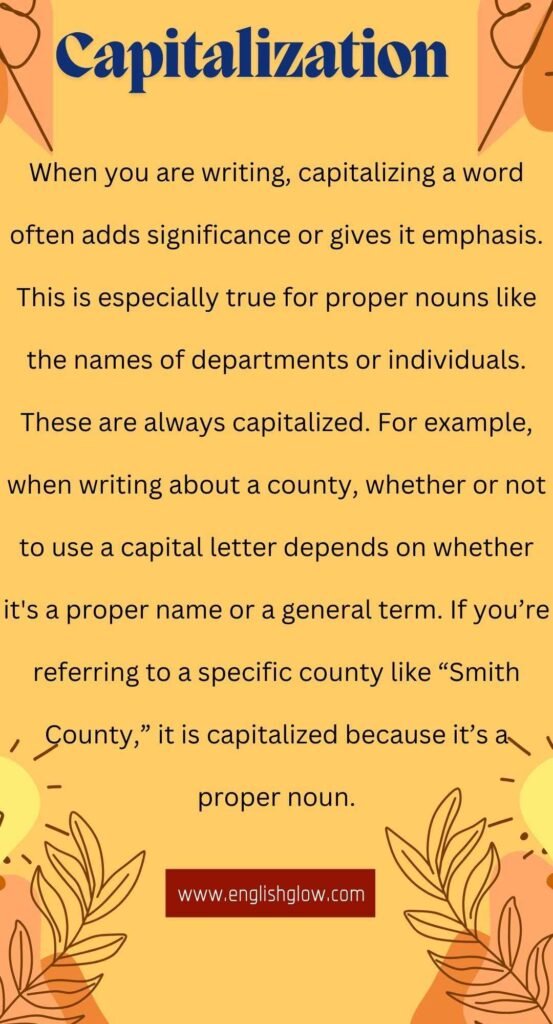When writing, you may wonder: Is the word “county” capitalized? The answer depends on when and how it’s used. In this article, we’ll explore the rules that help determine whether or not the word “county” should begin with a capital letter. This is important for writing accurately, especially if you’re talking about a specific place.
The word “county” is capitalized when it is part of a proper name. For example, if you’re referring to a specific county like “Smith County,” the word county should always start with a capital letter. In a sentence like, “She lives in Smith County,” the word county is part of the name, and so it’s capitalized.
On the other hand, when you are talking about a generic county, such as in the sentence “I don’t know which county she lives in,” the word county is lowercase. This is because it’s used in a more general sense, without naming a particular county.
The geographical region or state also helps decide how you should write the word. In larger areas like a country, where there are many counties, it becomes essential to know whether the word should be capitalized or not. In the context of cities and regions, place names are usually capitalized, but generic terms like “county” often remain lowercase unless part of a proper noun.
For example, “She’s driving through the county to visit a city,” shows that “county” is lowercase because it’s generic. However, “She’s heading to the City of Dallas in Smith County” demonstrates how county is capitalized when it’s tied to a specific name.
Examples
To make this clearer, let’s look at another example: “They live in a rural county.” Here, we’re not talking about any particular place, so county remains lowercase. But in the sentence, “They live in a rural area of Jefferson County,” the word county is part of the name, so it is capitalized.
There are two main rules to remember:
- Capitalize the word “county” when it is part of a proper name, like “Smith County.”
- Keep it lowercase when you are using it to refer to a generic county without mentioning a specific one.
- This applies to many other words in geographical writing, where proper nouns are capitalized, and generic terms are not.
In summary, whether to capitalize the word county in your writing depends on how it’s used and whether it is part of a specific name or a generic reference. Keep these rules in mind, and you’ll never have to wonder whether county should start with a capital letter again!
Capitalization
When you are writing, capitalizing a word often adds significance or gives it emphasis. This is especially true for proper nouns like the names of departments or individuals. These are always capitalized. For example, when writing about a county, whether or not to use a capital letter depends on whether it’s a proper name or a general term. If you’re referring to a specific county like “Smith County,” it is capitalized because it’s a proper noun.
On the other hand, when county is used in a general sense, it’s written in lowercase. For instance, “She lives in a county near the river,” would not be capitalized because it doesn’t refer to a specific place. This rule also applies to academic degrees. For example, we write about a bachelor’s degree in a general sense, but when you mention a specific title like “Master of Public Administration,” you must capitalize it.
Examples
- He hopes to earn his Master of Arts in education next spring.
- She is majoring in Asian studies, while her friend is studying English.
It’s clear from these examples that proper nouns like English are always capitalized, but general subjects such as chemistry are not. Similarly, if you refer to specific courses like “Introduction to Sociology,” you would capitalize it.
Another common example is with formal titles. If a title like Senator or Senate Member comes before the name, you should capitalize it. But if it follows, like “Christine Miller serves as a senator,” it’s lowercase. So, when you write about the Academic Senate of the California State University, the full title is capitalized.
This rule also applies after a colon. You only capitalize the first word if what follows is a complete sentence. If not, it stays lowercase.For instance, “There is one rule: capitalize only when necessary.”
It’s interesting to note that certain place names, especially political divisions like states, cities, or counties, follow these capitalization rules.For instance, “The state of California has numerous counties, such as Los Angeles County and Orange County.”
Examples
- The Business and Finance division is collaborating with the student support department.
- I intend to visit the Bay Area and Southern California this summer.
- In the end, whether you’re referring to an academic major, proper noun, or a geographical location, it’s important to remember the rules for capitalization. Knowing when to capitalize adds clarity and precision to your writing.
you might enjoy reading: By Which or In Which? Master the Subtle Difference Instantly
Exceptions:
When it comes to capitalizing certain words, there are exceptions that help maintain clarity and accuracy.For example, titles in formal listings, such as an agenda for the Board of Trustees’ meetings, should always be capitalized. This includes an address or any Academic Degrees mentioned. However, if you see common names for plants, animals, or diseases, they are usually lowercase unless they are proper names. An example would be “the Russian wheat aphid,” where only the proper name is capitalized.
Additionally, proper names of recognized geographical regions are capitalized, like the Great Plains or the Midwest, but local areas, such as western Kansas, do not follow this rule. When mentioning departments and organizations, you should capitalize their proper names while using shortened versions in lowercase, like Department of Agronomy versus agronomy. Also, when referring to multiple units like counties or departments, you should not capitalize the plural form, as in Clay County and Riley County versus Clay and Riley counties.
There are also some grammar nuances to consider, like child care, which is written as two words when used as a noun, but it does not take a hyphen. In contrast, co-author and co-worker are hyphenated. Furthermore, the words choose and chose are not interchangeable. Choose means to select wisely, while chose is the past tense of that verb.
In summary, spelling and grammar require attention to detail. Knowing when to capitalize and understanding the exceptions to the rules is essential for clear and professional writing. By paying attention to these specifics, you can ensure your writing is both correct and effective.
Capitalization guide
When it comes to writing, it can be hard to know when to capitalize certain words. This guide will help you understand the difference between capitalization and lowercase. Often, it depends on whether a specific place or person is being referenced.
Proper nouns are always capitalized. These include the official names of places, people, or organizations. For example, “University of Nevada, Reno” is capitalized, while you would say “the university in Reno” when using a general term. Similarly, specific landmarks or locations like the “Grand Canyon” are capitalized, but you would write “canyon” in lowercase when referring to a general type of geography.
In the same way, certain areas like “Clark County” must be capitalized, while using the term “county” in a general sense would be lowercase. The same rule applies to specific institutions like the “House of Representatives.” However, when you mention general members, you would write “many representatives voted.”
When discussing government bodies, the “United States Senate” is capitalized, while saying “most senators believe” keeps the word lowercase. This pattern also holds true for presidents. For example, you would write “President Obama” when mentioning him specifically, but “past presidents” is lowercase since it refers to a group or concept.
By following these rules, you can improve your writing and ensure that you use capitalization correctly in various contexts.
The Correct Way to Capitalize “County” in Formal Writing
When discussing whether to capitalize the word “county,” it’s important to know the context. If you are talking about a specific county by its full name, like Clark County, then you should capitalize it. This is similar to how we write a specific title, such as “Bachelor of Science.” For example, you might say, “I live in Clark County.” In this case, “county” is part of the official title, so it gets a capital letter.
However, when using the word “county” in a nonspecific way, it should be written in lowercase. For instance, if you say, “I live in a county,” it does not refer to a particular place, so “county” remains lowercase. This rule applies to many words in writing. Just as we write “bachelor’s degree” in lowercase when it is not a specific title, we do the same with “county” when it is used generally.
When you refer to departments or organizations, the same logic applies. For instance, the “Department of Veterans’ Affairs” is capitalized because it is a specific institution. Yet, if you talk about the “fire department” without naming it, you write it in lowercase. This distinction helps keep writing clear and professional.
In summary, knowing when to capitalize words like “county” or titles is essential for proper grammar. It ensures that your writing is accurate and understandable, making it easier for readers to follow along. Understanding these rules can enhance your writing skills significantly.
When do you capitalize “country”?
If the question asks when the word ‘country’ is capitalized, the answer is only when it begins a sentence, e.g. “Country and western music is popular in the southern United States.” There may be an exception that hasn’t occurred to me, but that’s the rule. If the question inquires when the name of a country is capitalized, the answer is always yes, for example:. “I’ve never visited Ghana but I have visited Japan.”
Languages, personal names, and the names of countries and other geographical entities (e.g., the Middle East) are classified as proper nouns, which are always capitalized in English. This also applies to adjectives derived from proper nouns, e.g.
- French culture and Chinese history.
- hen it’s at the beginning of a sentence, e.g.:
- In English, you capitalise
- The first word in a sentence
A proper noun includes examples like Fred, London, Tuesday, World War I, and Thailand.
In title case, you might see it as: No Country for Old Men.
It is occasionally capitalized after a colon if the following clause contains multiple sentences.
Additionally, it should be capitalized at the beginning of a quotation if the quote is a complete sentence.
If you are inquiring about when to capitalize a country’s name, rather than the term “country,” the answer is always yes. Country names are considered proper nouns.
When do I capitalize the word “region” in a sentence?
It depends on how you’re using the word “region” in a sentence. If “region” is at the beginning of a sentence, always make sure to capitalize it. The same rule applies if you’re using it as a proper noun, such as in “I work in Region 1.” However, understanding when to capitalize can be tricky because it varies based on the style you’re following and the specific meaning you want to convey. For example, consider how a government agency might use “Eastern Region” and “Western Region” to describe parts of the country that have been officially divided for a specific purpose. In that context, you should capitalize the terms because they serve as a formal designation.
On the other hand, if you’re simply saying “I work in the eastern region of the country,” you generally do not capitalize it. The rule changes because, in this case, “region” is being used generically rather than as a formal title. You’ll also need to consider if a style manual you’re following has specific rules about capitalization. It’s best to remember: capitalize if it’s a proper noun or beginning a sentence. Don’t capitalize if you’re using it generically, or if a style manual specifically says not to capitalize it.
If you’re ever unsure, remember the context matters, and when in doubt, consult a reliable style manual for guidance.
you might enjoy reading: Mine as Well, Might as Well, or Mind as Well? Unravel the Truth
When do you capitalize county and dept.? County land county-owned emergency management (dept.) trailers County Garage
Knowing when to capitalize words like “county” and “department” can be confusing, but it’s all about context. If “county” or “department” is part of the actual name of an entity—like Arlo County Fire Department or Arlo County Police Department—you should capitalize it. The same rule applies to places like Arlo County Public Library. However, when you’re using these terms generically, as in “the county fire department at Arlo” or “the police department at Arlo County,” there’s no need to capitalize. This distinction helps keep writing clear and prevents confusion, especially when mentioning multiple counties or departments in a single piece.
There are exceptions when geo-administrative terms like county, state, province, or district are used as generic descriptors. For example, if you refer to “the fire departments of Arlo, Brougham, and Canning counties,” you can see that the term “counties” is lowercase because it doesn’t refer to one specific county. In contrast, if you say, “Arlo County, Brougham County, and Canning County have well-funded fire departments,” you’d capitalize them since they’re formal designations of each county.
When referencing entities like “county courts in Arlo, Brougham, and Canning,” you’re again dealing with generic use, so lowercase is preferred. However, if I say, “The court at Arlo County has new policies,” I’m referring to a particular county, so capitalization is needed. The same rule goes for “state” or “province”—always capitalize when it’s part of an official title, like “Washington State” or “Manitoba Province,”but not when they are used in a generic sense, such as “our own state or province.”
Here’s an example from my personal experience: when I was applying for a driver’s license at the Texas Department of Public Safety, I noticed that all the office signs had “Department” capitalized. This is because it’s the name of a specific department. However, when we talk about department stores in general, like “the departments in a local store,” there’s no need to capitalize. These subtle differences are crucial when deciding whether to capitalize terms like “county” or “department.”
Should Every Word Be Capitalized in a Title?
This is a grammar question that often confuses many people. Grammar rules usually organize how words are used in a sentence. However, when it comes to titles, the question becomes more about usage. The general rule is that you don’t need to capitalize certain words like prepositions, coordinating conjunctions, or articles unless they are the first or last word of the title. For instance, in the title “The Killing of Sister George,” the article “The” is capitalized because it is the first word of the title. Meanwhile, words like “of” (a preposition) and “and” (a conjunction) aren’t capitalized because they don’t meet the rule.
People often feel overwhelmed by this because it sounds like a bunch of gobbledygook to remember. Instead of trying to memorize these rules, it’s better to pay close attention to titles you come across in newspapers or books. For example, many newspapers only capitalize the first word of a headline or subheadline to save on ink and paper. This can help you quickly understand when capitalization is necessary.
Let’s take another example: in the title War and Peace, “War” and “Peace” are both capitalized because they are nouns. However, “and,” being a conjunction, is not. On the other hand, consider a book called Basic Integral Calculus. Every word here is capitalized because it’s the title of a specific work, and each word has significance in the context of the noun phrase Integral Calculus. Knowing these rules will give you confidence and help you apply grammar rules more effectively.
Ultimately, if you’re unsure, keep it simple: capitalize the first and last word of a title, and always capitalize important words like nouns, adjectives, and verbs.
FAQ
Should “county” be capitalized?
“County” should only be capitalized when it is part of a proper noun, such as in a specific county’s name (e.g., “Orange County”). When referring to counties in general, it is written in lowercase (e.g., “The county is located in the northern region.”).
Is “country” capitalized in a sentence?
“Country” is not capitalized unless it is part of a proper noun, like a specific country’s name (e.g., “France”). If you’re referring to “country” in general terms, it remains lowercase (e.g., “He lives in a different country.”).
How do you write “county” or “counties”?
“County” is singular, and “counties” is the plural form. They follow normal capitalization rules, where both are capitalized only if part of a proper noun (e.g., “Los Angeles County” or “the counties of California”).
Do counties have capital letters?
Counties are capitalized when you mention the full name of a specific county (e.g., “Bexar County”). When referring to counties generically or in plural form, lowercase letters are used (e.g., “The counties in Texas are large.”).
What is the definition of “emasculate” in reference to women?
While “emasculate” traditionally means to deprive a man of his male role or identity, when used in the context of women, it can refer to weakening or reducing someone’s power or strength. However, the term is primarily associated with masculinity and is rarely applied to women, as it carries gendered connotations. When discussing a similar concept for women, terms like “disempower” or “marginalize” might be more appropriate.
Is “county” capitalized or not?
“County” is only capitalized when it is part of a proper noun, such as “Orange County.” If used generally, as in “the county decided,” it is not capitalized.
Is “county” capitalized in AP style?
According to AP Style, “county” should be capitalized when part of a proper noun (e.g., “Los Angeles County”). When referring to it generically (e.g., “the county board”), it remains lowercase.
When to capitalize “city” and “county”?
Capitalize “City” and “County” when they are part of a proper name (e.g., “New York City” or “Jefferson County”). If you’re referring to them in a general sense (e.g., “the city has many parks” or “the county is large”), they should be lowercase.
Is “counties” capitalized when plural?
“Counties” should only be capitalized when used as part of a proper noun (e.g., “Orange and Los Angeles Counties”). If referring to counties in general, it should not be capitalized (e.g., “the counties in the region”).
What is the definition of “emasculate” when referring to a woman?
“Emasculate” typically refers to the removal or weakening of masculinity in men, but when used in reference to a woman, it can metaphorically mean to strip away her power, strength, or sense of control, often in the context of undermining authority or independence.





